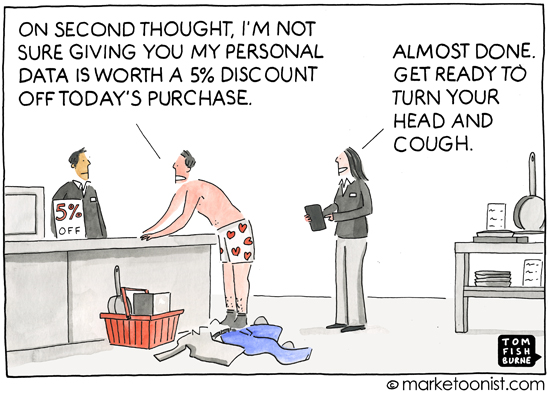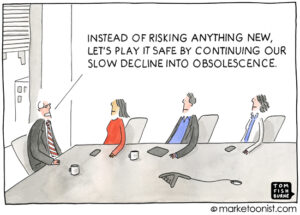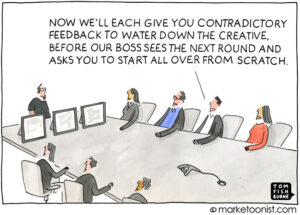Consumers are increasingly aware just how much personal data they’re sharing with marketers. Whether browsing online or shopping in a store with a loyalty card, consumers reveal a lot of themselves every time they interact with a brand.
In a recent Communispace study (PDF), 86% of consumers would click a “Do Not Track” button if one existed and 30% would pay a 5% premium for a guarantee that their personal data would not be captured.
Yet 52% of consumers would share their personal data with marketers for discounts, with younger consumers more comfortable sharing personal data. A majority of Millennials and Gen X-ers would share data for discounts, while a majority of Boomers and Silents would not.
As I cartooned a couple of months ago, it will be interesting to watch how different brands navigate the tradeoffs of consumer privacy with personalization and relevance. I think that the brands that do best will be the ones that let consumers have a say in what data they share and how that data is used.
The Communispace study raised some interesting takeaways for marketers:
“Our research suggests serious risks for companies who don’t respect their customers’ wishes for privacy and control, and who continue to push messages – even personalized messages – without providing corresponding means for customers to seek them out and signal their intentions…
“While people increasingly accept some loss of privacy as a cost of doing business, or a way to earn perks, the majority say they do not appreciate the covert tracking that takes place in the name of “added value” and “customized experiences.”
“It … suggests a real opportunity for companies ready to engage with consumers on their terms and re-negotiate power in the vendor-customer relationship.”
I’d love to hear your thoughts on how marketers should navigate personal data.
(Marketoonist Monday: I’m giving away a signed print of this week’s cartoon. Just share an insightful comment to this week’s post by 5:00 PST on Monday. Thanks!)



Irene Ng says
The biggest issue about sharing personal data is not about what data is shared and how it might be used by the company but the value and worth of that personal data, which is ambiguous and uncertain. It is this ambiguity and uncertainty that make some decide to give away and others fearful. When we part with a dollar, we know what a dollar is worth and what it can buy. With personal data, we do not know the potential of what can be ‘bought’, and neither do we know what is is worth because the worth and value of personal data sits in contexts of use and most contexts (except some such as loyalty programmes) are not known.
This is why a market for personal data has to emerge so that as individuals, we can be more informed in terms of personal data value, worth, use and exchange.
And it will happen soon! See http://hubofallthings.com for more information. 🙂
Irene
Irene Ng says
Apologies but the website is down currently. It is real though, the academic version is here http://www2.warwick.ac.uk/fac/sci/wmg/research/business_transformation/ssg/research/value/hat/
Joseph Bentzel says
“Turn your head and cough”…. exactly.
But becoming worse by the day as seen in the Facebook experiment and the associated denial of marketing professionals about the extent of the mainstreaming of digital ‘skinner box marketing’.
In most cases now there is no data “sharing” at all. It is non-permissioned data theft, and the theft is not just “personal data” but the entire context in which an online consumer or business user is “engaged” by the marketer.
The morality of the modern digital marketing profession is now a few rungs below the morality of the tobacco industry and the Medellin Cartel at the pinnacles of their power.
Here’s my opinion of these folks.
https://medium.com/@Platformula1/digital-skinner-box-marketing-196641c08678
Ori Pomerantz says
I think Gen-Xers and Millennials realize that a lot of the traditional privacy we used to have is going away anyway. It is too easy to collect and correlate information with modern technology.
I think what matters isn’t what information the marketers have, but how they use it. I don’t have the time and energy to see what company X knows about it, so letting me opt in or out isn’t going to do much good. Marketers need to figure ways to use this information without creeping me out.
Amazon’s “we think you’ll also like” option for books is an excellent example. It isn’t intrusive, and they don’t reveal enough of the algorithm to creep me out. Also, it is a pull mechanism – I see them when I want to look at books, not when Amazon feels like it is time for me to come back and visit them. Push media is a lot more annoying, because it puts itself where we don’t want it (nicely illustrated here).
Ati Sinaga says
Who actually reads the privacy policy statement? Consumers generally have less interest in understanding and reading the small prints. Trust is the key. They are willing to give their personal data away as long as there is a trust. If this trust is broken, it is hard to mend. Then they will turn to government and push for a better regulation, such as ‘Do Not Track’ (DNT) regulation introduced by the US State of California Assembly Bill AB 370. I would not surprise if this regulation would force changes in privacy policies globally.
As a marketer, we MUST RESPECT the trust and treat the personal data as mutual benefits, and NOT ABUSE it.
Bob says
As a tailend boomer that’s been online longer than the Internet itself, you’d think I’d be more relaxed about sharing info with marketers but not so. As I patiently describe to the requests for points, airmiles and other ‘club’ cards, I prefer to pay r the ‘privacy’ tax that helps pay the loyalty program overhead for others. So when you came it that way, some of us are already paying for privacy. As I like to proclaim, I prefer to remain completely pointless.
Pet peeve of contemporary incentive marketing for me though is the near extinction of the package contained contest. You know, ‘look under the cap foot a chance to win cash instantly’ as opposed to go online, give us all your personal info for a chance to win the same. Right after you complete this fun survey, of course.
#ThinkLikeMike says
I think this goes beyond just sharing information to get a discount, websites are allowing people to use their social media or email accounts as their logins so they don’t have to create a new account. However in doing so, they are granting those website services to access their Facebook friends or the like. Which is why I have a fake Facebook account with my name as initials that I use for all such matters. 🙂
Valerie Lambert says
I recently switched doctors and while filling out forms, I had to explain to three different staffers that I wasn’t answering X questions – and why – since my marital status, social security number, etc. had no bearing on my healthcare…since they each kept badgering me about what “I left blank/unanswered.”
They each looked at me with bewilderment. I may as well have said, “There was no room on your form to list my three heads.”
I think more people need to leave irrelevant questions deliberately unanswered – and tell companies WHY: “You don’t NEED this information about me!”
#ThinkLikeMike says
@Valerie – The reason medical forms ask you for your SSN is because if you don’t pay them they have what they need to report your unpaid bill to Collections and have it on your credit report. I agree, there is no reason whatsoever they need to know this and other information other than my insurance information and my contact information. I don’t even give them my email address, and if they really press for it I give them my spam email account. #ThinkLikeMike